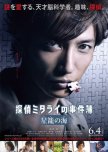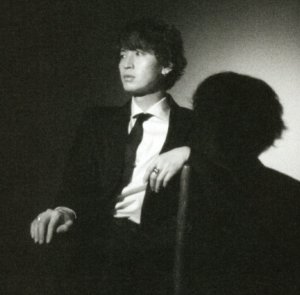
Chaotic, complex, and eye-opening.
First things first - watching this film was an experience. I thought that I was watching a documentary rather than a film - this is probably influenced by the fact that this is based on true events. I got sucked into its delivery and realism which was quite heavy to take in. If you aren't used to watching heavily-themed films, then this will be a difficult one to watch.MOTHER reminds me of a Nojima Shinji kind-of story wherein the 'negative sides' of humanity, the complexities of human relationships, are laid bare. They aren't shown in a showy manner but as they are - dirty, difficult to comprehend, and even psychotic. The relationship between Akiko (the mother) and Shuhei (the son) is anything but what society sees as acceptable, yet to the latter, it is his norm and accepted reality. This film isn't just about murder, abuse, and casual sex - it's also about how twisted 'love' can be, how manipulation and violence can play heavily into a person's sense of dependency and reliance, and how things aren't always understandable on the surface, especially one of a relationship between a mother and son who have been together all their lives, one that's for better or for worse.
Impressive acting by the cast, especially by Nagasawa Masami - a natural, I must say - and Okudaira Daiken, whose eyes and expressions tell more than what he says. Hats off to Gunji Sho's Shuhei as well. The story moves from one timeline to another yet with consistency that doesn't leave you completely hanging. The music and the silence came in at the right times, adding to the heavy atmosphere that the film has.
If you're looking for a film that's gonna make you feel blissful, this is not that. MOTHER is gonna leave you with thoughts to ponder on and with an ending that doesn't inspire - it's simply a naked cut.
Was this review helpful to you?

A remarkable take on exploring a wife's identity, morals, desires, and romance.
I love how this film tackles infidelity in a different light. It isn't simply about wanting the forbidden fruit solely because of selfish desires, but it goes to tell viewers that a married woman may possibly be more than just a man's personal trophy, a mother to her children, and a figure who stays at home to solely do household work, to want nothing more in life than all of that.Putting into mind Japan's collective perspective on such an identity, this film goes to break such a concept by telling its audience that a housewife isn't simply a robot to be told what to do; they are living, breathing creatures who also have their own wants and passions.
In the film, one of the things I enjoyed was the transition between the scenes, i.e. going from Point A to B, then going back to A to continue it. While at first it may confuse you - as to whether what's happening takes place in the current timeline or not - you'll later understand its flow and be captured by its charm.
This film isn't fast-paced nor is it too slow - it's just right. Imagine yourself riding waves of the sea, not knowing where you are going exactly at that moment, but nonetheless enjoying the journey.
I also absolutely loved the chemistry between both leads and the atmosphere the cast gave off in general. Toko (Kaho) and Kurata's (Tsumabuki) sex scenes were breathtaking. I loved how they weren't put in the film solely for the sex; the emotions, the silent exchanges, the build-up. They were scenes that would linger on one's thoughts even after the film ends. In general, this film does that - it makes you think, reflect, and understand.
The music was also a huge plus. None of the tracks or bgms stood out in the wrong way. They all added to the atmosphere of the scenes they were in, adding beauty and life to those moments.
I would recommend this if you're looking for a film showing a different perspective on infidelity and how blaming the one who cheated in black or white reasoning isn't as simple as it is. There's always a gray area to explore in relationships and putting a ring on it shouldn't eradicate that at all. It is meant to be explored rather than caged and hidden within. I will definitely give this another rewatch just to pick on the little details and to think twice of various lines mentioned in the film.
Was this review helpful to you?

While at a glance it seems like a Yuri/Lesbian drama, it is *far* from one; I have to say it is not even one at all. The story and the characters revolve themselves around character relationship development, human drama, and psychological factors. If you have watched one of Nojima Shinji's work, then you would understand what I mean.
The story goes by in a rush - Yuri meeting Kairi again after so long, and then Kairi suddenly being really friendly and engaging with Yuri. The whole interaction does not really sink in just yet - and it's natural to be suspicious of a character like Kairi who just came from nowhere and on pure coincidence - but Yuri's innocence and honest personality allows Kairi to quickly become a part of Yuri's daily life.
Yuri Dano Kan Dano's story line is not its strong point, but the cast involved in the production of this drama. They're the main reason I decided to finish the drama. They had a strong dynamic and were able to build characters that stuck to their personalities. Baba Fumika was able to portray Yuri's pure and innocent, easily swayed but strong-willed personality really well. Kojima Fujiko was also able to bring out Kairi's mysterious and multifaceted character to life. If Yuri is a light, then Kairi is a shadow. The rest of the cast's characters were not specifically given time to be likable due to the limited amount of scenes they had; Zaiki Takuma's Shuji was able to stand out though. I have to applaud his portrayal of Shuji's fun and quirky playboy persona.
To sum things up, this drama tries to show the contradicting sides between a person who is too innocent and honest to see the darkness in people's hearts and a person who has been in that said darkness for a long time and longs to become someone who has yet to be tainted and wants to be loved without judgment and foul intents. The drama tries to show the dark sides that people may have inside their hearts - wanting, jealousy, greed, longing, and such. It doesn't specifically 'fix' those parts, but shows them to us. Kairi becomes a means for Yuri to see such a dark world while trying to protect the latter from getting tainted by it. The friendship they share does go beyond the accepted relationship between friends - they explore different contexts that may be a taboo to talk about in a conservative society like Japan - making them much more mutual than common friends.
I would not go out to recommend this drama, but if you are a fan of the cast, then you would enjoy the interaction they have between their characters as I see them challenging themselves and going beyond the norm. Just keep in mind that, again, the story, imo, is not really something worth getting into.
Was this review helpful to you?

Detective Mitarai's Casebook: The Clockwork Current
1 people found this review helpful
First, I'd like to discuss its similarities and differences with the prequel. Just like it, the movie starts off with the mysteries right away wherein cases of different origins actually intertwine with one another. This time, however, everything is a tad more complicated than before. We weren't just touching the cases themselves, but even tackling a diverse number of topics ranging from historical events to personal past grudges and more. It was also amusing seeing Mitarai outside nearly the whole time in this film, although all things considered, the cases here did not happen around his place after all [and since Ishioka isn't around for this one, he doesn't have anyone to push on his work to]. The movie also had a much more serious tone than that of the prequel.
Tamaki Hiroshi's Mitarai still remains as charismatic and wise as before, albeit due to the change in the cast and character relationships, it's a bit lonely this time around. I have to admit, the surrounding characters were pretty much just prop, only following Mitarai's lead, as opposed to his conversations with i.e. Ishioka in the prequel that sure added amusement. What interests me as well is that Ishioka's character seems to be presented somewhat differently here. Domoto Koichi's Ishioka was refined yet curious and engaging at the same time. Ishioka in this (although we only get to hear him during a phone call) was much "louder"; Ogawa (Hirose Alice) also shares this very trait which can be annoying and noisy to perceive. We also get to see more faces this time around, so the jump to each of them can be a little overwhelming to follow.
While it is a fun thriller, I would have to admit that a number of things were happening at once and the diversity of subjects we're exposed to do not add up much to the mystery; they turned into rather extensive backstories that complicated things further. Knowing them *did* help in revealing the answers of the cases, but in my opinion, we ended up spending too much time unpacking those that we didn't really focus on the cases themselves.
I wouldn't go out to recommend this, but nonetheless, I enjoyed the journey towards the end.
Was this review helpful to you?

Tensai Tantei Mitarai: Nankai Jiken File - Kasa wo Oru Onna
1 people found this review helpful
If you're into the dynamic between Sherlock Holmes/Dr. Watson, then this will likely be enjoyable for you.
The "mystery" isn't too predictable; the way it is put together and solved by Mitarai (Tamaki Hiroshi) will leave you asking yourself questions all the way to the end. It doesn't start off slow and steady; you're presented with the "mystery" - that ends up turning into a murder case! - right from the start.
While it is a drama (or a TV drama special, to be specific) under crime/detective, it also has its moments of humor and fun which add up to its enjoyment. Also, it isn't too flashy - it's not too difficult nor complicated to take in. The casts' dynamic was also amusing to watch including the little body gestures and expressions they do that are unique to their own characters (i.e. a special mention to Ishioka (Domoto Koichi) for his cute outfits and trusting relationship with Mitarai). The music's pretty dramatique and crime-solving-esque, giving off a feeling of excitement while being delivered cooly. I think the build-up towards the end could have been a little better, but nonetheless it was delivered with a satisfying finish.
If you would like to entertain yourself with a unique case filled with questions from start to finish, I would definitely recommend this drama for you. And with that, I might likely rewatch this again in the far future (i.e. when I've forgotten the mystery and would like to look back at it once again).
Was this review helpful to you?





